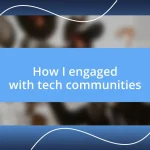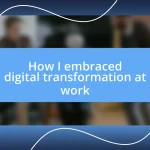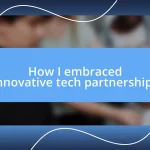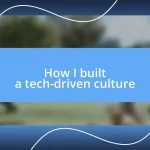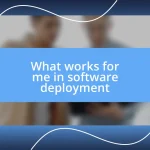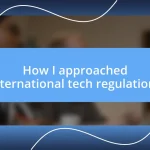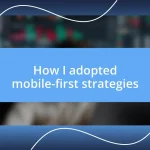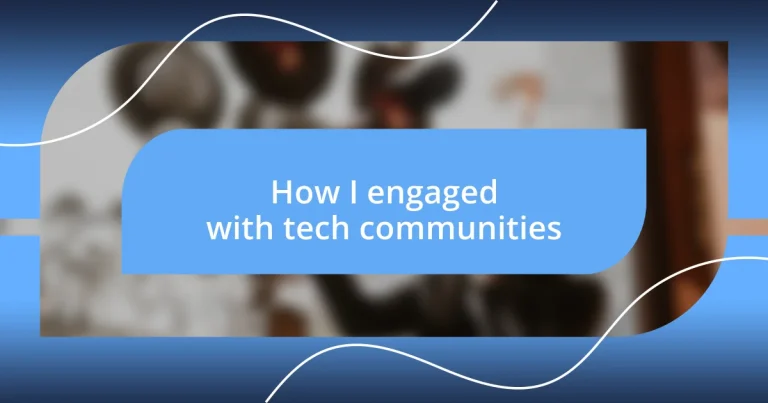Key takeaways:
- Tech communities foster collaboration and support, leading to lasting friendships and personal growth.
- Finding the right platform for engagement is essential; different platforms cater to various interaction styles and community cultures.
- Building and maintaining meaningful connections through authenticity, consistent engagement, and support significantly enriches experiences in tech communities.
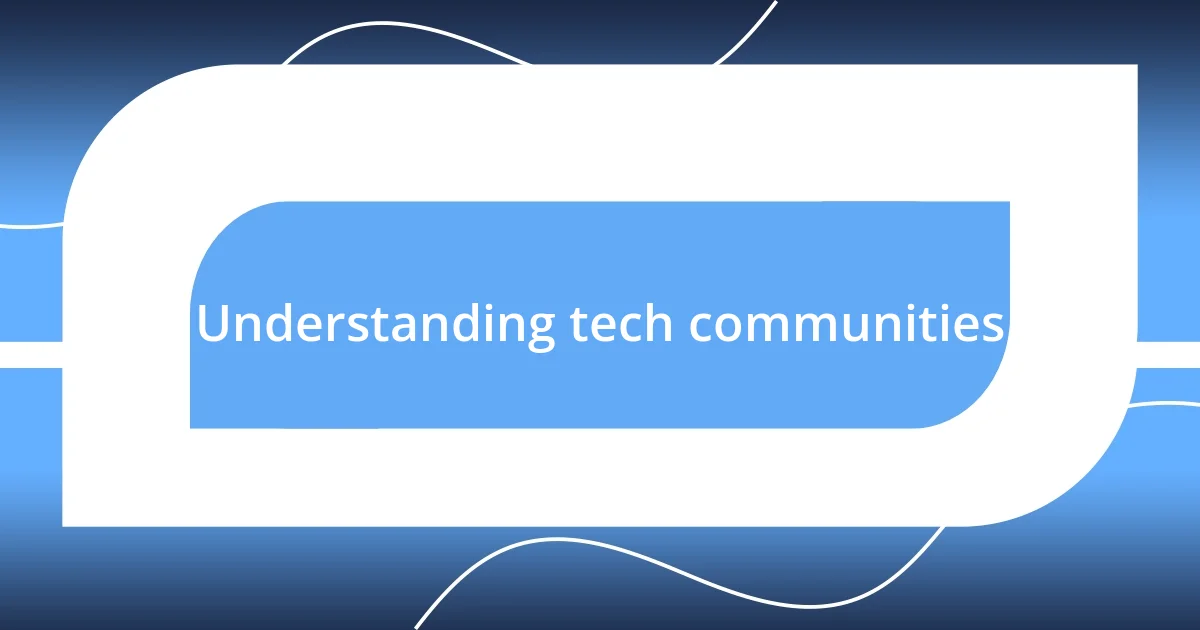
Understanding tech communities
It’s fascinating how tech communities can feel like a second home to many of us. I remember the first time I joined a local coding meetup; I was both nervous and excited. Being surrounded by people who shared my passion made me realize that these communities are all about collaboration and support, not just competition.
Diving deeper into these communities, I see them as a melting pot of knowledge and experience. There’s something unique about learning from someone who has been in the trenches. Have you ever felt that sense of belonging when discussing a project with someone who gets it? I’ve found that these connections often lead to lasting friendships, both online and offline, which enhances our personal and professional growth.
Moreover, tech communities thrive on diverse perspectives. I once participated in a workshop where attendees ranged from novices to industry veterans. Listening to their stories enriched my understanding and sparked ideas I never would have considered. This diversity fosters innovation, urging us to think outside our standard frameworks. What experiences have you had that opened your eyes to new possibilities within your community?
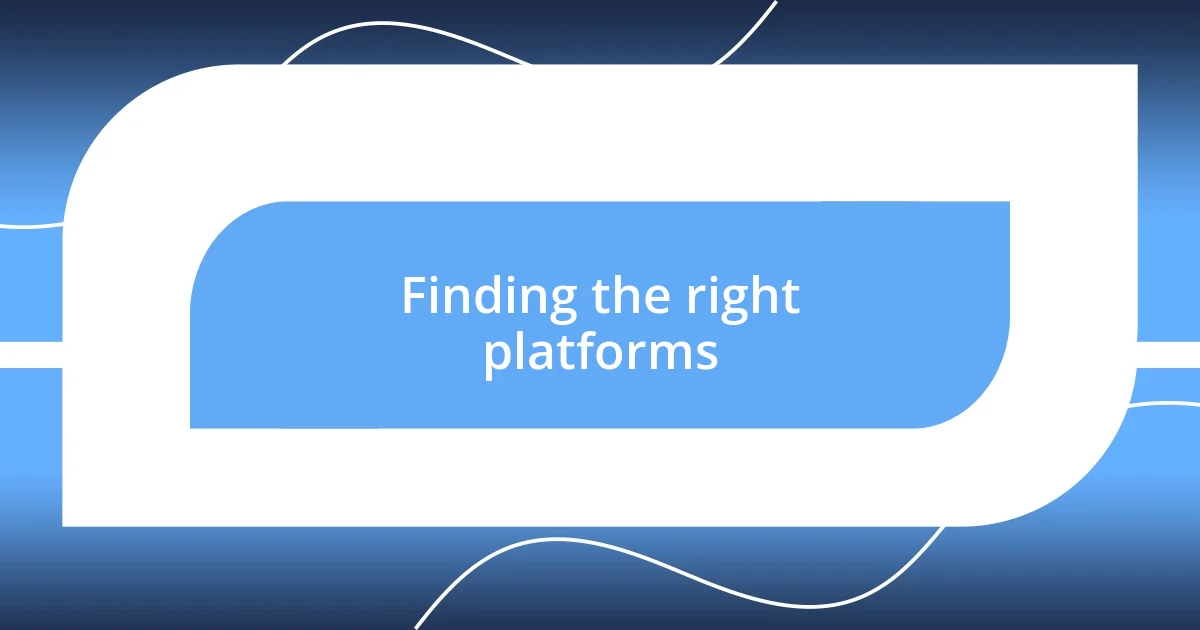
Finding the right platforms
Finding the right platforms to engage with tech communities can feel like searching for a needle in a haystack. I’ve tried a few, and it’s remarkable how the atmosphere can vary dramatically between them. For instance, Slack groups feel vibrant and fast-paced, but sometimes I found them overwhelming with constant messages. On the other hand, forums like Stack Overflow provide more structured exchanges, which can feel more manageable. Have you ever felt a platform was too noisy, making it hard to focus on what really mattered?
As I explored different platforms, I noticed that each had its unique flavor. In my experience, Discord channels are buzzing with real-time conversations, perfect for those who thrive on immediate feedback, while LinkedIn groups often skew towards a more professional demeanor, making it great for networking but sometimes lacking that casual vibe. This variety really emphasized the importance of finding a platform that resonates with my personal style and goals. Which environments make you feel most comfortable when sharing your ideas?
Ultimately, the right platform for you depends on what you hope to achieve. In my case, I found that platforms blending casual interaction with opportunities for structured learning worked wonders. It’s all about aligning your expectations with the community culture. That way, you can engage meaningfully and grow alongside others who share your interests.
| Platform | Strengths |
|---|---|
| Slack | Fast-paced, collaborative communication |
| Stack Overflow | Structured Q&A format, great for problem-solving |
| Discord | Real-time interaction, community building |
| LinkedIn Groups | Professional networking, structured discussions |
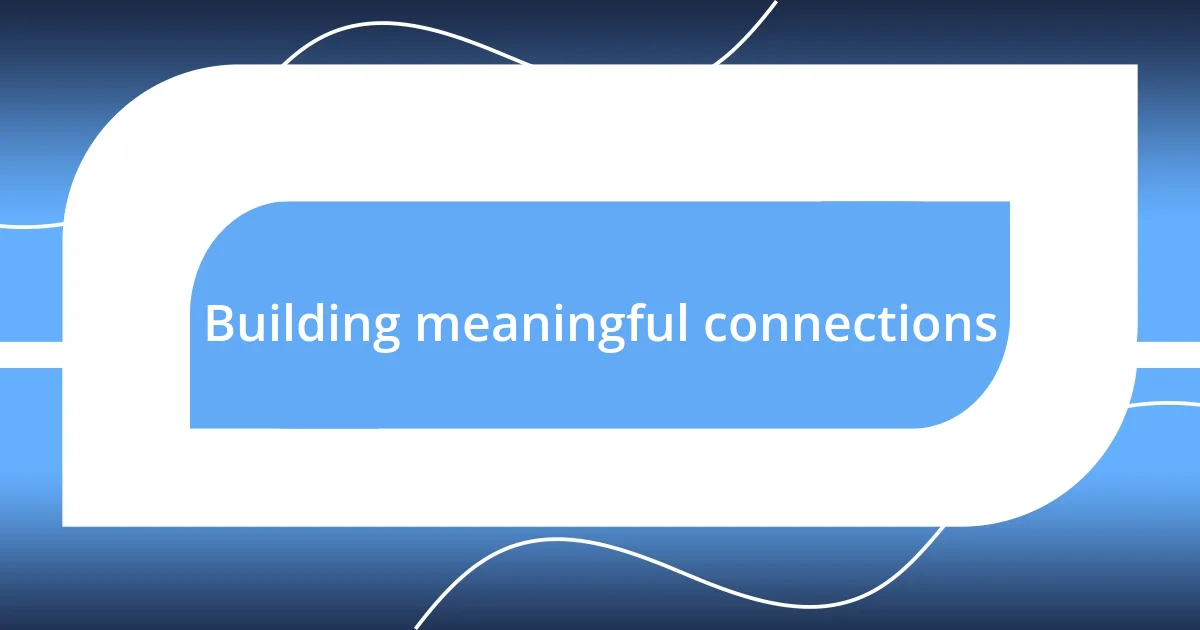
Building meaningful connections
Building meaningful connections within tech communities can truly transform our experiences. Reflecting on my journey, I recall a heartwarming moment during a hackathon where camaraderie blossomed while collaborating on a project. It was exhilarating to share ideas and problem-solve together, creating a bond that went beyond just the event. Those friendships grew into lasting partnerships, reminding me that genuine connections often arise from shared challenges and collective victories.
To foster these connections, I’ve discovered a few key strategies:
- Be authentic: Share your thoughts and experiences openly. Vulnerability can lead to deeper connections.
- Engage consistently: Show up regularly in discussions or gatherings to build familiarity with others.
- Offer support: Lending a hand to someone who’s stuck can create a strong sense of community and trust.
- Follow up: After initial interactions, reach out to see how their projects are going or just to chat. It shows you care.
Taking these steps has made a tremendous impact on my engagement within tech communities; each interaction feels more enriching and rewarding. I genuinely believe that investing in these relationships enriches our personal and professional journeys in ways that go far beyond networking.
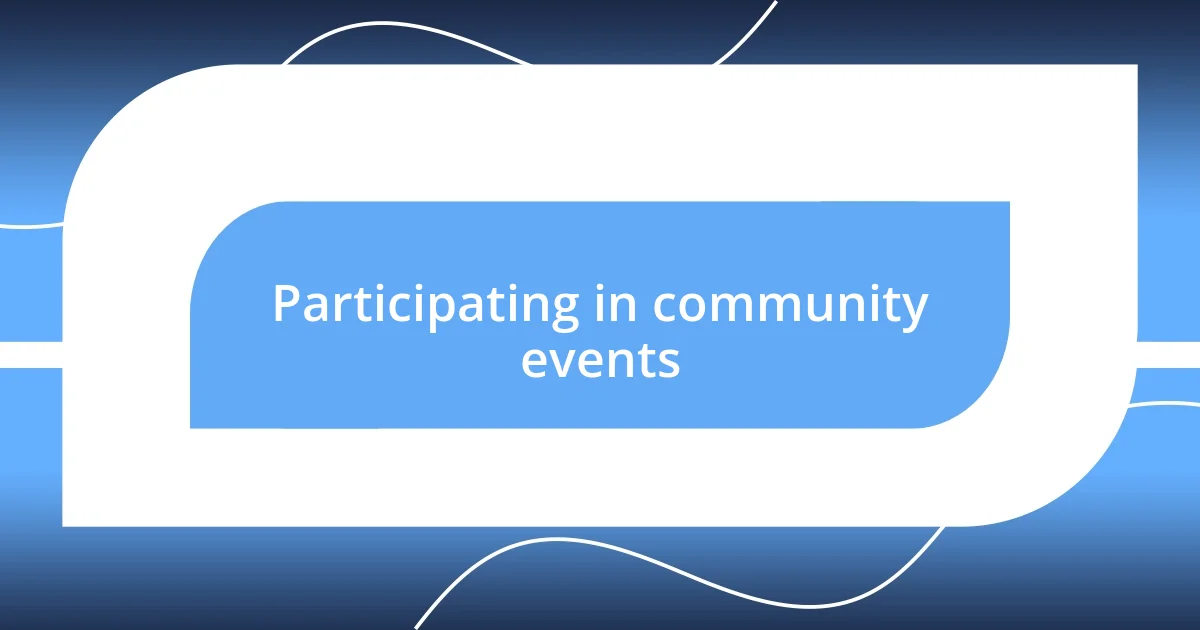
Participating in community events
Participating in community events has always been a dynamic part of my tech journey. I remember my first local meet-up—it was both exciting and nerve-wracking. Walking into a room filled with strangers who were all buzzing about tech felt overwhelming, yet the conversations sparked immediate connections. I found myself engaging in deep discussions about ongoing projects, which not only fueled my motivation but also opened doors to potential collaborations. Have you ever experienced that rush of connecting over shared interests?
One of the standout experiences for me was attending a tech conference where I met brilliant minds during breakout sessions. I still recall the collaborative workshops where we tackled real-world problems and shared insights that significantly enriched my understanding. The beauty of these events is the atmosphere of learning; you can feel the energy as ideas bounce around the room. It’s a reminder that tech is not just about codes and algorithms; it’s about people and shared experiences.
I’ve also learned the importance of stepping outside my comfort zone at these events. Whether it was striking up conversations during lunch or volunteering to lead a small group, each interaction helped me grow not just as a tech enthusiast but as an individual. I often ask myself what makes me hesitant to engage, and overcoming that barrier has always led to rewarding outcomes. By pushing myself to participate actively, I’ve discovered that the value lies not only in the knowledge gained but also in the connections formed.
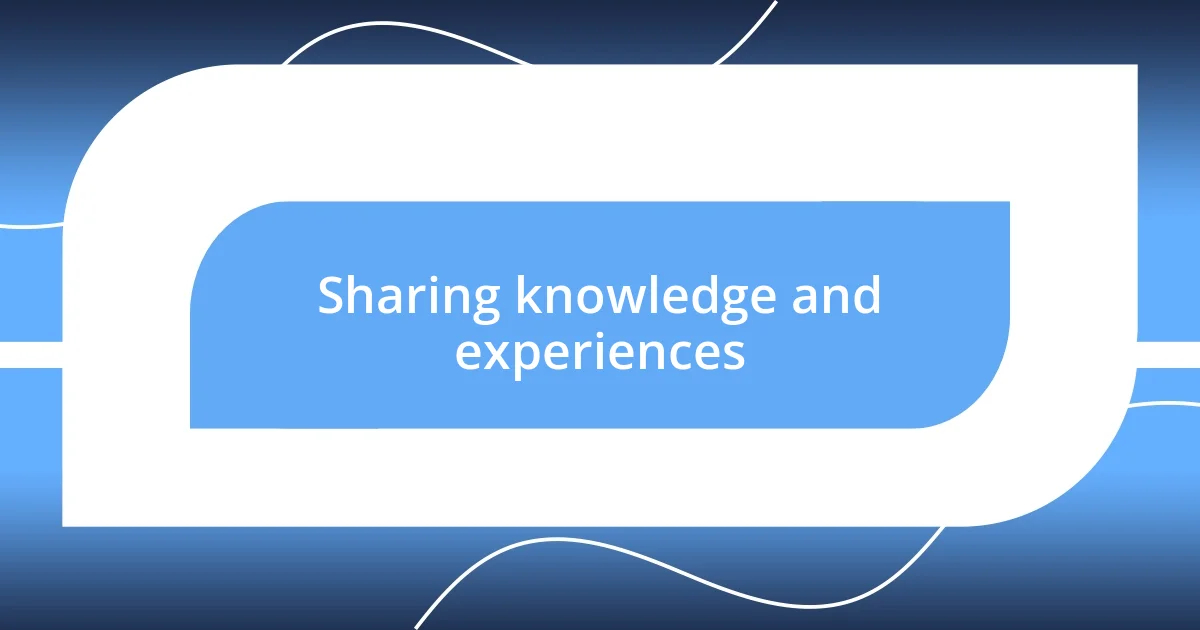
Sharing knowledge and experiences
Sharing knowledge and experiences has been one of the most fulfilling aspects of my journey in tech communities. I vividly remember a late-night coding session with a group of fellow developers, where we traded tips not just on software but on personal projects and career pathways. There’s something powerful about exchanging knowledge; it deepens our understanding and reinforces the notion that none of us are in this alone. Have you ever had a moment when sharing a simple technique sparked a whole new idea for someone else? It’s those breakthroughs that remind me of the value we all bring to the table.
I’ve often found that hosting informal “tech talks” can amplify this sharing even further. Just last month, I gathered a few friends over coffee to discuss our latest coding experiences. This casual setting encouraged us to open up about our successes and the challenges we faced—like the time I grappled with a persistent bug for days only to find out it was a misplaced semicolon! Relating these experiences transformed my perspective; it was a shared moment of laughter, and it made me realize that vulnerability is a powerful connector. By sharing our so-called failures, we create a safe space for others to do the same.
Additionally, I’ve noticed that sharing can extend beyond verbal discussions. Online forums and platforms like GitHub have enabled me to showcase my projects while inviting constructive feedback from others. Last year, I posted a side project I was passionate about, and the positive responses were incredibly rewarding. The collaborative exchanges that followed shaped the project in ways I hadn’t anticipated. Isn’t it incredible how sharing can lead to collective improvement? This exchange of ideas not only boosts our individual growth but also enriches the wider tech community, making us all better innovators.
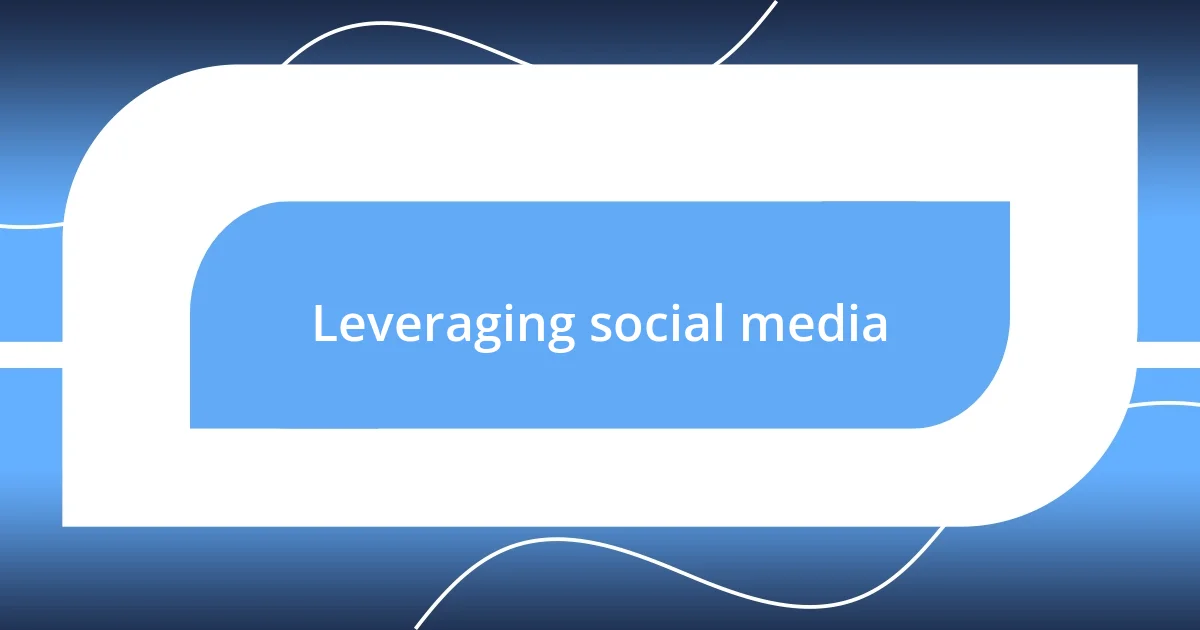
Leveraging social media
Leveraging social media has changed the way I engage with tech communities immensely. I recall the day I joined a few Facebook groups dedicated to programming languages I was trying to master. The flood of questions and problem-solving discussions made me realize I wasn’t alone in my struggles. Isn’t it comforting to know there are so many people in the same boat, ready to help each other out?
One night, while scrolling through Twitter, I stumbled upon a thread about a challenging algorithm problem. I hesitated at first, but decided to jump in and share my thoughts. That simple engagement led to a series of back-and-forth exchanges, illuminating concepts I had never considered before. I felt a genuine ball of excitement in my chest as I realized that social media not only connects us but propels our learning forward in real-time.
I’ve also experienced the power of social media for networking. A LinkedIn connection I made through a discussion on a coding issue eventually led to a job opportunity. The warmth in that moment was priceless—it was as if a pathway had opened just by engaging in a digital conversation. Have you thought about how much potential lies in those brief interactions online? Each tweet, post, or comment could be a stepping stone to something bigger, creating a ripple effect that extends beyond the screen, into our professional lives.
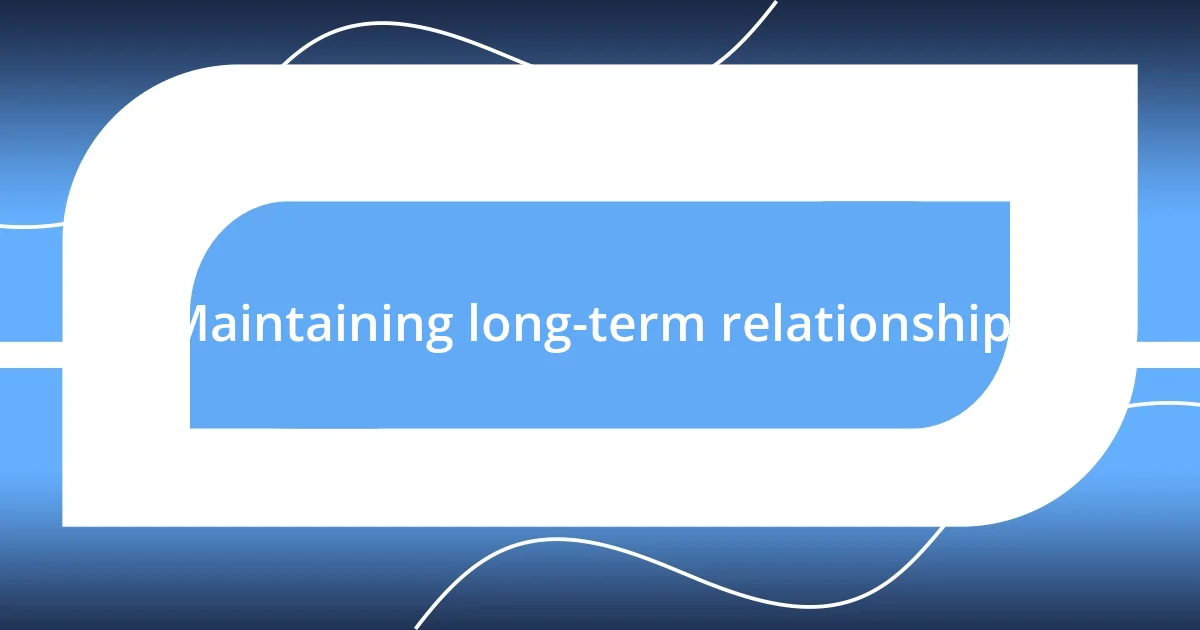
Maintaining long-term relationships
Maintaining long-term relationships in tech communities is a journey shaped by consistent engagement and mutual support. I’ve learned that reaching out periodically, whether through a simple message or an invitation to connect over coffee, solidifies these connections. Just last month, I shot a message to a fellow developer I hadn’t spoken to in a while, and it turned into a meaningful conversation that reignited our collaborative spirit. Have you ever experienced that moment when a simple check-in turned into a brainstorming session that reignited your passion for a shared project?
One crucial aspect is being genuinely invested in the growth of others. For example, I remember helping a friend with their app launch and being there to celebrate that milestone. That shared joy built a deeper bond; it reminded me that each victory in the community is collective rather than solitary. Doesn’t it feel rewarding to lift others as you climb? It nurtures a culture of support that becomes invaluable over time.
Additionally, I find that offering my expertise without expecting immediate returns can strengthen these relationships. When I recently volunteered to conduct a workshop for newcomers, not only did I enhance my own understanding, but I also observed how my efforts brought people closer together. The excitement in the room as we tackled challenging topics fueled a sense of belonging I hadn’t anticipated. It made me think: Are we not all better when we share our strengths? This attitude transforms casual acquaintances into lifelong friendships.
